Alabama government contractor background checks require specialized expertise beyond standard employment screening, particularly for defense and aerospace companies operating near Redstone Arsenal and Huntsville's technology corridor. Federal contractors must navigate complex requirements including security clearance coordination, DCAA compliance, and FAR regulations while ensuring their screening processes meet both federal standards and Alabama state law to maintain contract eligibility and avoid costly compliance violations.
Key Takeaways
- Alabama government contractors must comply with multiple screening frameworks including FAR clauses, NISPOM requirements, and state-specific background check regulations that vary significantly from commercial employment screening.
- Redstone Arsenal and Huntsville's aerospace corridor house over 300 federal contractors requiring specialized background verification that coordinates with Defense Counterintelligence and Security Agency (DCSA) processes.
- Security clearance eligibility screening differs fundamentally from standard background checks, requiring coordination with federal investigation timelines and adjudication standards that can extend 12-18 months.
- Small and medium-sized contractors pursuing their first federal contracts face unique compliance challenges, with background check deficiencies ranking among the top three causes of contract award delays in 2024.
- Alabama's Right to Work status and specific ban-the-box legislation create unique compliance considerations for government contractors that differ from neighboring states.
- DCAA-compliant timekeeping and personnel verification requirements mandate specific documentation standards that generic background screening providers typically cannot accommodate.
- Multi-tiered screening approaches are essential, with different verification depths required for cleared positions, sensitive uncleared roles, and general contractor personnel.
- Ongoing monitoring and reverification obligations extend beyond initial hiring, with contractors facing audit exposure if they cannot demonstrate continuous compliance with personnel security requirements.
Understanding Alabama's Government Contracting Landscape
Alabama's defense and aerospace sector generates over $19 billion in annual economic impact. Huntsville consistently ranks among the top metropolitan areas for federal contract spending per capita. The concentration of Department of Defense facilities, NASA operations, and major prime contractors creates a unique ecosystem where background screening requirements extend far beyond typical employment verification.
The Redstone Arsenal corridor alone employs approximately 40,000 workers across hundreds of contracting companies. This concentration creates both opportunities and compliance challenges as contractors compete for talent while navigating overlapping security requirements. Many companies new to federal contracting underestimate the complexity differential between commercial background checks and government contractor screening protocols.
Federal screening standards supersede state requirements, yet both frameworks must be satisfied simultaneously. Government contractors in Alabama must understand this layered compliance environment to avoid costly mistakes during contract execution.
Federal Contracting Density in Alabama's Key Regions
Alabama's government contracting activity concentrates in specific geographic and industry clusters. Each region presents distinct background screening challenges. Understanding these regional differences helps contractors implement appropriate verification protocols.
| Region | Primary Contracting Focus | Typical Clearance Requirements | Screening Complexity Level |
| Huntsville/Madison County | Missile defense, aerospace, cybersecurity | Secret to TS/SCI common | High - multi-agency coordination |
| Montgomery | Air Force logistics, training systems | Secret clearances, some uncleared | Moderate - primarily DoD standards |
| Mobile | Shipbuilding, maritime systems | Confidential to Secret | Moderate - ITAR considerations |
| Birmingham | IT services, administrative support | Often uncleared or Public Trust | Lower - focus on suitability |
These regional variations require screening providers to understand facility-specific requirements and local security office protocols. A one-size-fits-all approach consistently fails in Alabama's diverse contracting environment.
Defense Counterintelligence and Security Agency (DCSA) Coordination
The transition from OPM to DCSA for background investigations fundamentally changed how contractors approach personnel security. DCSA's Trusted Workforce 2.0 initiative implements continuous vetting and emphasizes reciprocity between agencies. However, contractors still face significant coordination challenges.
Pre-screening for clearance eligibility before submitting SF-86 forms can prevent wasted resources on candidates unlikely to receive favorable adjudications. Effective DCSA coordination requires understanding investigation tiers, from Tier 1 through Tier 5 for TS/SCI investigations. Contractors must track investigation status through DISS (Defense Information System for Security) and maintain interim security procedures for personnel awaiting final clearances.
Federal Contractor Background Check Requirements
Federal contractor background checks operate under a distinct regulatory framework that commercial employers rarely encounter. The Federal Acquisition Regulation (FAR), Defense Federal Acquisition Regulation Supplement (DFARS), and National Industrial Security Program Operating Manual (NISPOM) create layered requirements. These vary based on contract type, classification level, and agency customer.
Understanding these requirements begins with distinguishing between security clearances and suitability determinations. Security clearances grant access to classified information and follow standardized DCSA investigation protocols. Suitability determinations assess fitness for federal employment or contractor positions and may involve agency-specific criteria.
Core FAR Clause Screening Requirements
Federal contracts incorporate specific clauses that mandate background screening elements. FAR 52.204-9 requires Personal Identity Verification for contractor personnel accessing federal facilities or information systems. FAR 52.222-48 mandates E-Verify participation for all new hires working on federal contracts.
Contractors must identify which FAR clauses flow down to their specific contracts and implement compliant screening processes. Common deficiencies include:
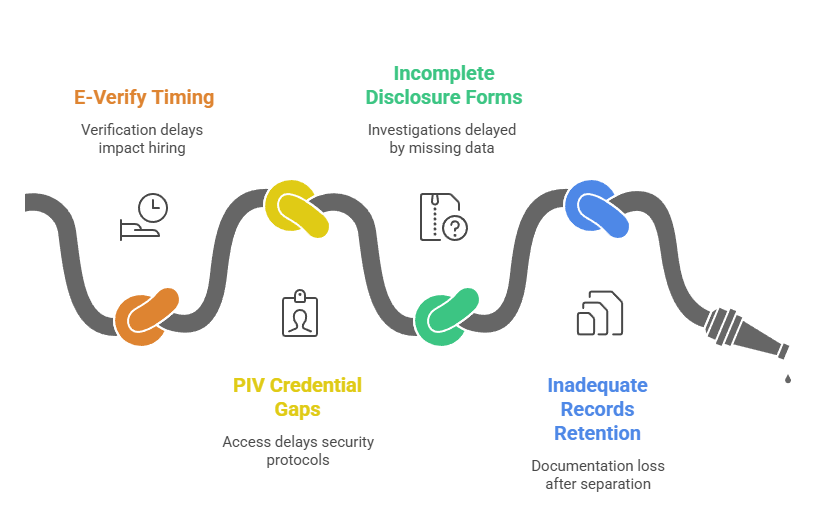
- E-Verify timing failures: Verification must occur within three business days of hire, not upon contract start
- PIV credential gaps: Failing to initiate PIV processing before facility access is required
- Incomplete disclosure forms: Missing elements on SF-85 or SF-86 submissions that delay investigations
- Inadequate records retention: FAR requires maintaining personnel security documentation for specified periods beyond employee separation
These compliance gaps expose contractors to cure notices, contract modifications, or employee removal requirements that disrupt project continuity. Pre-emptive screening alignment with contract-specific requirements prevents these disruptions.
Security Clearance Levels and Investigation Tiers
The federal security clearance system operates across three classification levels. Each requires progressively intensive background investigations. Contractors cannot conduct clearance investigations themselves—only DCSA performs these—but they can pre-screen for eligibility factors and manage the submission process strategically.
| Clearance Level | Investigation Tier | Average Processing Time (2024) | Alabama Contractor Prevalence |
| Confidential | Tier 3 (NACLC) | 4-6 months | 15% of cleared positions |
| Secret | Tier 3 or 5 | 8-12 months | 60% of cleared positions |
| Top Secret | Tier 5 (SSBI) | 12-18 months | 25% of cleared positions |
These timelines create workforce planning challenges, particularly for contracts with near-term start dates. Many Alabama contractors maintain "bench strength" of cleared personnel or pursue interim clearances to bridge gaps. However, interim adjudications have become increasingly restrictive since 2023 policy updates.
Alabama-Specific Employment Screening Considerations
While federal requirements dominate government contractor screening, Alabama state law creates additional compliance layers. The state's employment regulations, particularly regarding criminal background checks and negligent hiring liability, intersect with federal standards. Contractors must navigate these carefully.
Alabama Code Title 13A governs criminal history reporting, with specific provisions limiting how employers may use certain conviction records. The state's ban-the-box protections, though narrower than many states, apply to public employers and contractors in specific circumstances. Understanding when Alabama law applies versus federal preemption determines compliant screening protocols.
Alabama Background Check Legal Framework
Alabama employers face fewer state-imposed restrictions on background screening than many jurisdictions. However, several key requirements demand attention. The state follows federal FCRA requirements for employment screening, but adds no additional state-level amendments.
Key Alabama employment screening considerations include:
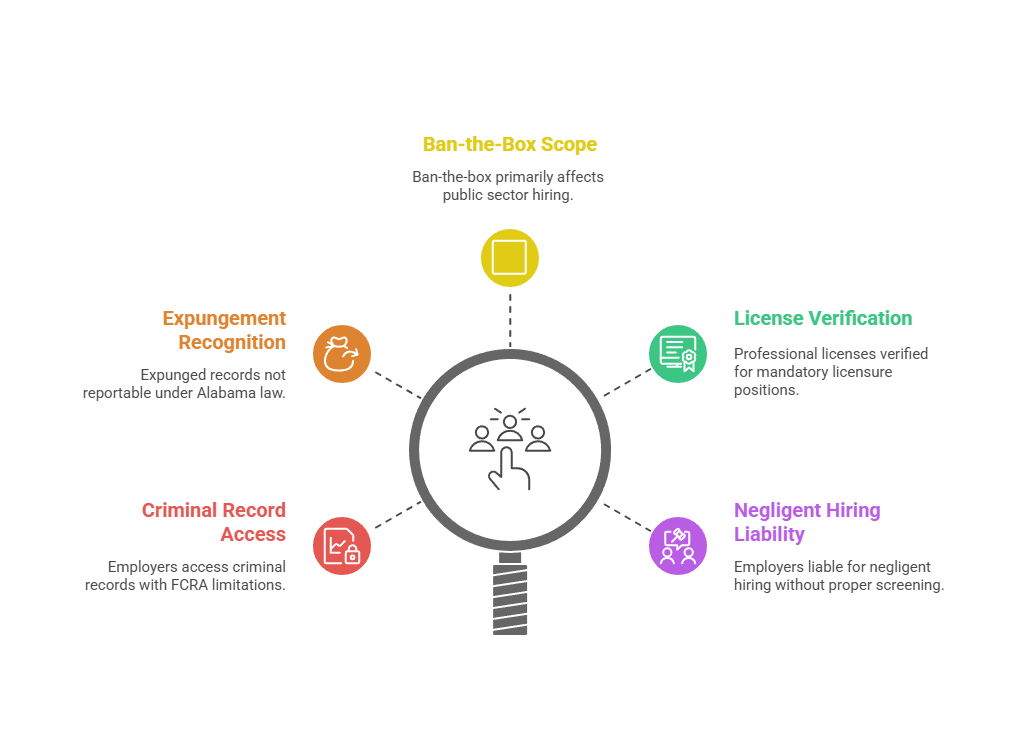
- Criminal record access: Alabama allows employer access to state criminal databases through approved vendors, with seven-year reporting limitations for most offenses under FCRA guidelines
- Expungement recognition: Alabama's expanded expungement provisions since 2021 mean certain conviction records may no longer be reportable
- Ban-the-box scope: Applies primarily to public sector and has limited applicability to most federal contractors
- Professional license verification: Alabama requires verification of professional licenses for positions where licensure is mandatory
- Negligent hiring liability: Alabama courts have found employers liable when they failed to conduct reasonable background screening for positions with foreseeable risk
Government contractors must layer these state requirements onto federal obligations, creating more comprehensive screening than either framework alone would require. Documentation proving compliance with both Alabama and federal standards protects contractors during DCAA audits and contract disputes.
Redstone Arsenal and Huntsville-Specific Requirements
Redstone Arsenal operates as a separate jurisdiction with unique access control requirements. The installation hosts multiple tenant organizations including Army Materiel Command, Missile Defense Agency, and FBI facilities. Each maintains distinct badging and access requirements.
Contractors with on-base work locations must coordinate multiple screening layers. Initial installation access requires National Crime Information Center (NCIC) database checks processed through Redstone's Access Control Division. These checks occur independently from security clearance investigations and can identify disqualifying factors like outstanding warrants or protection orders. Many contractors mistakenly assume cleared employees automatically receive base access, but separate approval processes apply.
Screening Components for Government Contractors
Comprehensive government contractor background checks involve multiple verification components. Each serves specific risk mitigation purposes. Unlike commercial employment screening that might involve only criminal records and employment verification, federal contractor screening typically requires 8-15 distinct elements depending on position sensitivity and contract requirements.
Contractors should implement tiered screening protocols that align verification depth with position risk levels. A janitorial contractor working in unclassified areas requires different screening than a systems engineer handling controlled technical data. Efficient screening design prevents both over-verification (wasting resources) and under-verification (creating compliance gaps and security risks).
Identity and Eligibility Verification
Every government contractor screening process begins with positive identity verification and work authorization confirmation. E-Verify participation is mandatory for virtually all federal contractors, with narrow exceptions for contracts under $3,000 or shorter than 30 days. E-Verify must be completed within three business days of hire for all employees working on or in connection with federal contracts.
The identity verification process should include:
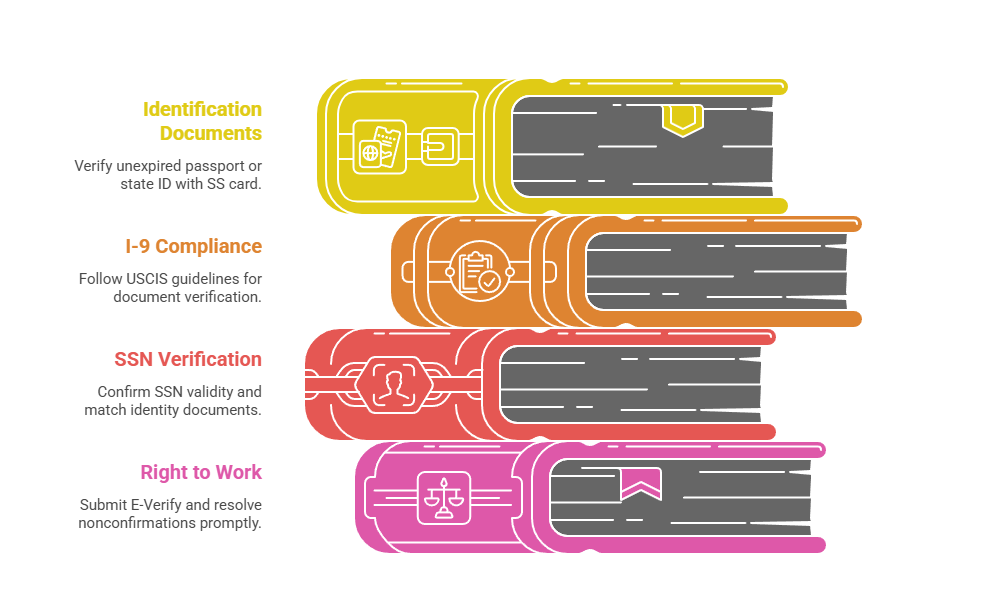
- Primary identification documents: Unexpired passport or combination of state-issued ID plus original Social Security card or birth certificate
- I-9 compliance with federal standards: Following USCIS guidance on acceptable documents and remote verification when applicable
- Social Security Number verification: Confirming SSN validity and matching to provided identity documents
- Right to work confirmation: E-Verify submission and resolution of any tentative nonconfirmations within required timeframes
Many Alabama contractors face challenges when hiring talent relocating from other states or countries. International candidates often require additional documentation like immigration status verification and potential export control compliance reviews if they'll access controlled technology.
Criminal Background Checks
Criminal history screening for government contractors must balance thoroughness with legal compliance and fairness. Federal contractors should conduct multi-jurisdictional criminal searches rather than relying solely on national databases. These often contain incomplete or outdated information.
A comprehensive criminal screening approach includes FBI fingerprint-based checks, statewide criminal database searches, county-level criminal court searches, federal district court criminal searches, and sex offender registry searches. Alabama contractors must navigate both FCRA restrictions on criminal record reporting and the practical reality that federal customers often expect disclosure of matters beyond FCRA reporting limits. When contract language requires disclosure of criminal history beyond seven years, contractors should seek legal guidance.
Individualized assessment of criminal findings is legally required under EEOC guidance and multiple court precedents. Contractors should implement documented review processes considering offense nature, time elapsed, rehabilitation evidence, and job-relatedness before making adverse decisions.
Security Clearance Coordination and Management

Security clearances represent one of the most complex aspects of Alabama government contractor background checks. They require coordination between contractors, candidates, DCSA, and government customers. Unlike background checks that contractors initiate and complete independently, clearance processing involves federal agency investigation and adjudication entirely outside contractor control.
Effective clearance management begins during recruitment, with realistic timeframe communication and eligibility pre-screening. Contractors should never promise clearance approval or specific timelines to candidates. Numerous factors influence investigation speed and adjudication outcomes.
Clearance Eligibility Pre-Screening
Smart contractors implement clearance eligibility pre-screening before investing significant resources in sponsorship. While no pre-screening guarantees clearance approval, systematic evaluation of common disqualifying factors helps contractors make informed sponsorship decisions.
Pre-screening should evaluate these key adjudication factors:
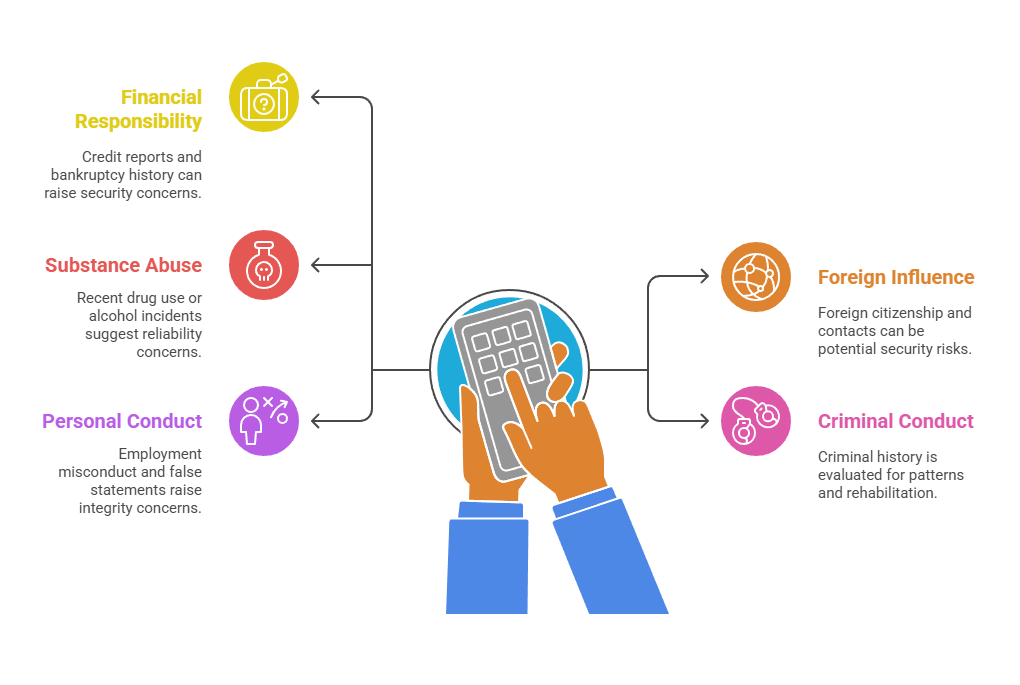
- Financial responsibility: Credit reports, bankruptcy history, significant delinquent debts, or patterns of financial irresponsibility raise security concerns
- Foreign influence considerations: Foreign citizenship, foreign contacts including family members, foreign financial interests, or foreign travel patterns
- Substance abuse history: Recent illegal drug use, prescription drug misuse, or alcohol-related incidents that suggest reliability concerns
- Criminal conduct: Criminal history including arrests, charges, and convictions, evaluated for patterns, seriousness, and rehabilitation evidence
- Personal conduct issues: Employment misconduct, false statements on applications, security violations, or other integrity concerns
Candidates should understand that dishonesty during the clearance process proves more disqualifying than most underlying issues. A candidate with past marijuana use who discloses it fully generally fares better than one who attempts concealment.
Interim Clearances and Bridging Strategies
Interim security clearances allow contractors to place personnel in cleared positions while final investigations remain pending. This addresses the persistent challenge of 12-18 month clearance timelines. However, interim adjudication standards have tightened considerably, with approval rates declining from roughly 70% in 2020 to approximately 50% in 2024.
Contractors operating in Alabama's competitive defense market employ several bridging strategies. These include clearance-holder recruitment, pipeline development through early sponsorship, unclassified work assignment during processing, and subcontractor partnerships for near-term cleared personnel needs. These strategies require different resource investments and organizational capabilities, with larger Alabama contractors typically maintaining more sophisticated clearance management programs.
DCAA Compliance and Audit Readiness
The Defense Contract Audit Agency (DCAA) conducts compliance audits for contractors performing under cost-reimbursable, time-and-materials, and certain fixed-price contracts. While DCAA audits primarily focus on accounting systems and cost allocation, personnel documentation including background screening records receives scrutiny. This occurs as part of labor charging compliance verification.
DCAA auditors examine whether contractors maintain adequate documentation supporting billed labor categories and hourly rates. Background check documentation forms part of this qualification evidence. Insufficient screening documentation can trigger questioned costs if auditors determine contractors billed for labor categories without adequate qualification verification.
Documentation Requirements for Personnel Files
DCAA-compliant personnel files should contain comprehensive documentation demonstrating employee qualifications for billed labor categories. Background screening records form a critical component of this documentation package, particularly for senior positions and specialized technical roles.
Each personnel file should include:
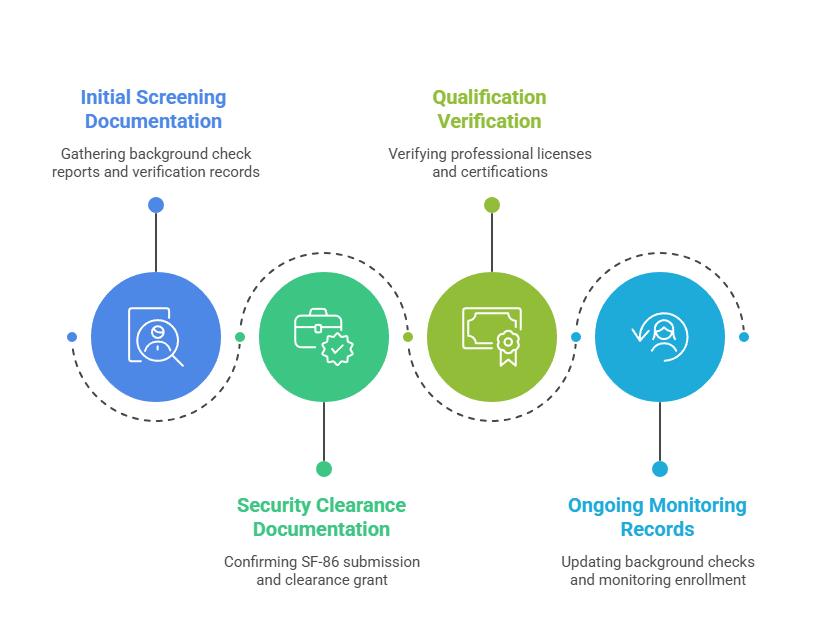
- Initial screening documentation: Background check reports, criminal history summaries, education verification confirmations, and employment verification records
- Security clearance documentation: SF-86 submission confirmation, investigation completion notices, clearance grant letters, and briefing acknowledgments
- Qualification verification: Professional licenses, certifications, transcripts, or other credentials supporting the employee's labor category assignment
- Ongoing monitoring records: Reverification documentation for positions requiring periodic background updates or continuous monitoring enrollment
The documentation must be contemporaneous with the screening activity, not created retroactively during audit preparation. DCAA auditors specifically look for evidence that screening occurred before contract work commenced.
Timekeeping and Labor Charging Verification
DCAA audits examine timekeeping systems to verify that charged labor actually occurred and was properly allocated to contracts. Background screening records intersect with timekeeping compliance when auditors question whether personnel charged to contracts met qualification requirements throughout the charging period. For positions requiring security clearances, contractors must maintain current clearance status documentation.
Alabama contractors should implement systems tracking clearance expiration dates, reinvestigation due dates, and periodic training requirements. Many contractors use spreadsheet tracking, though specialized security management software provides more reliable monitoring for companies with significant cleared populations.
Selecting Background Screening Providers for Government Contracts
Government contractors need screening partners with specific expertise beyond typical employment background check capabilities. Generic screening providers often lack familiarity with federal requirements, security clearance coordination, and the documentation standards necessary for DCAA compliance. Selecting appropriate screening providers requires evaluating their government contracting experience, FCRA compliance capabilities, data source quality, and customer service responsiveness.
Alabama contractors should prioritize providers with demonstrated federal contracting expertise. This includes familiarity with defense industry requirements and DCSA processes. Cost considerations matter, but selecting providers based solely on price frequently results in inadequate screening that creates downstream compliance problems.
Provider Qualification Criteria
Contractors should evaluate potential screening providers against specific qualification criteria ensuring they can deliver compliant, comprehensive services. Key factors separate qualified providers from generic employment screening companies.
Critical evaluation factors include:
- Government contracting experience: Demonstrated history serving federal contractors with understanding of FAR/DFARS requirements
- FCRA compliance: Proper disclosure/authorization procedures, adverse action process support, and dispute handling capabilities
- Data source quality: Direct courthouse access for criminal records, accredited education verifications, and comprehensive databases
- Turnaround time: Realistic timeframes for comprehensive screening with rush services for urgent needs
- Customer support: Knowledgeable staff available for compliance questions and FSO coordination assistance
Alabama contractors should request provider references from similar companies and verify those references contact actual clients with comparable screening needs. Providers sometimes present references from clients with entirely different screening requirements, limiting their relevance for government contracting evaluation.
Compliance Documentation and Audit Support
The best screening providers deliver more than investigation reports—they provide audit-ready documentation packages supporting DCAA compliance and government oversight requirements. This includes properly formatted reports, clear documentation of verification methodologies, and records retention meeting federal requirements. Providers should deliver documentation showing complete chain of custody, clear verification methodologies, compliance with reporting restrictions, and date-stamped records.
Some providers offer audit support services, assisting contractors during DCAA audits by providing verification letters and explaining screening methodologies. This support proves invaluable for contractors facing their first DCAA audits or those with limited internal compliance expertise.
Conclusion
Alabama government contractor background checks require specialized expertise combining federal security requirements, state employment law compliance, and defense industry best practices. Contractors operating in Huntsville's aerospace corridor and across Alabama's defense industrial base must implement comprehensive screening protocols. Success requires selecting experienced screening providers, training internal personnel on compliance obligations, and establishing systematic processes that prevent documentation gaps. As federal contracting competition intensifies and compliance scrutiny increases, thorough background screening becomes both a risk management necessity and a competitive differentiator for Alabama's government contractors.
Frequently Asked Questions
How long does it take to get a security clearance for government contractor positions in Alabama?
Security clearance processing times vary significantly by clearance level and current DCSA workload. As of 2024, Secret clearances typically require 8-12 months from SF-86 submission to final adjudication, while Top Secret clearances average 12-18 months. Interim clearances may be granted in 2-4 months for Secret-level positions if initial investigation components return clean. Alabama contractors should plan workforce needs 18-24 months in advance for positions requiring clearances.
What criminal history disqualifies someone from federal contractor positions?
No single criminal offense creates automatic disqualification for all federal contractor positions, as adjudication follows a whole-person assessment. However, espionage, terrorism-related offenses, and intentional unauthorized disclosure of classified information effectively disqualify candidates for cleared positions. Recent serious crimes like violent felonies, sexual offenses, or financial crimes create substantial adjudication challenges. Contractors should implement individualized assessment processes evaluating offense circumstances and rehabilitation before making adverse decisions.
Do Alabama government contractors need to use E-Verify?
Yes, virtually all federal contractors must participate in E-Verify under FAR clause 52.222-54. This applies to contracts exceeding $3,500 and 30 days duration. Contractors must enroll in E-Verify, verify all new hires within three business days of employment commencement, and verify existing employees assigned to federal contracts. Alabama is also a mandatory E-Verify state for public employers and many private employers, creating overlapping state and federal obligations.
What's the difference between a security clearance and a background check?
Security clearances are federal government determinations granting access to classified information, requiring extensive DCSA investigations examining 10+ years of personal history. Only federal agencies can grant clearances, not employers or screening companies. Background checks are employer-initiated employment screening processes verifying criminal history, employment, education, and other relevant information. Government contractor positions often require both: the clearance grants classified access while the background check satisfies employer suitability and contract compliance obligations.
How often must government contractors reverify employee backgrounds?
Reverification frequency depends on contract requirements, security program obligations, and position sensitivity. Security clearances require periodic reinvestigation every 6 years for Top Secret and 10 years for Secret clearances, with continuous vetting monitoring between formal investigations. Many contracts incorporate clauses requiring periodic background check updates, commonly every 3-5 years for sensitive positions. Contractors should also reverify backgrounds when employees transfer to positions with higher security requirements or when continuous vetting alerts identify potentially disqualifying information.
Can contractors work at Redstone Arsenal without a security clearance?
Yes, many contractor positions at Redstone Arsenal do not require security clearances but still demand installation access approval through separate background checks. Redstone's Access Control Division processes installation access requests through NCIC database checks. This process operates independently from security clearance investigations, so cleared employees still need separate base access approval. Contractors should initiate access processing 4-6 weeks before requiring on-base work to accommodate investigation and badging timeframes.
What background check components are required for uncleared government contractor positions?
Uncleared federal contractor positions typically require identity verification through E-Verify, criminal background checks covering 7-10 years, employment verification, and education verification for positions with degree requirements. Positions involving facility access require PIV credential issuance, mandating FBI fingerprint checks. Contracts involving Controlled Unclassified Information (CUI) may require specific screening elements under DFARS 252.204-7012. The specific components depend on contract clauses, position sensitivity, and customer agency requirements.
How do Alabama's background check laws affect federal contractors?
Alabama maintains relatively employer-friendly background check regulations with fewer restrictions than many states. However, federal contractors must comply with both state and federal requirements. Alabama law prohibits discrimination based solely on arrest records not resulting in conviction and requires FCRA compliance for employment screening. Federal requirements often exceed Alabama standards, with FAR clauses and security program obligations mandating more extensive screening. Contractors should implement screening processes satisfying the more stringent of applicable Alabama or federal standards.
Additional Resources
- Defense Counterintelligence and Security Agency (DCSA) - Security Clearance Information
https://www.dcsa.mil/is/niss/ - Federal Acquisition Regulation (FAR) - Latest Version
https://www.acquisition.gov/browse/index/far - National Industrial Security Program Operating Manual (NISPOM)
https://www.ecfr.gov/current/title-32/subtitle-A/chapter-I/subchapter-D/part-117 - Defense Contract Audit Agency (DCAA) - Audit Guidance
https://www.dcaa.mil/ - EEOC Guidance on Criminal Background Checks
https://www.eeoc.gov/laws/guidance/enforcement-guidance-consideration-arrest-and-conviction-records-employment - Federal Trade Commission - Fair Credit Reporting Act Compliance
https://www.ftc.gov/legal-library/browse/statutes/fair-credit-reporting-act - Alabama Department of Labor - Employment Law Resources
https://labor.alabama.gov/ - E-Verify Program - Enrollment and Compliance Information
https://www.e-verify.gov/

GCheck Editorial Team
Meet the GCheck Editorial Team, your trusted source for insightful and up-to-date information in the world of employment background checks. Committed to delivering the latest trends, best practices, and industry insights, our team is dedicated to keeping you informed.
With a passion for ensuring accuracy, compliance, and efficiency in background screening, we are your go-to experts in the field. Stay tuned for our comprehensive articles, guides, and analysis, designed to empower businesses and individuals with the knowledge they need to make informed decisions.
At GCheck, we're here to guide you through the complexities of background checks, every step of the way.





